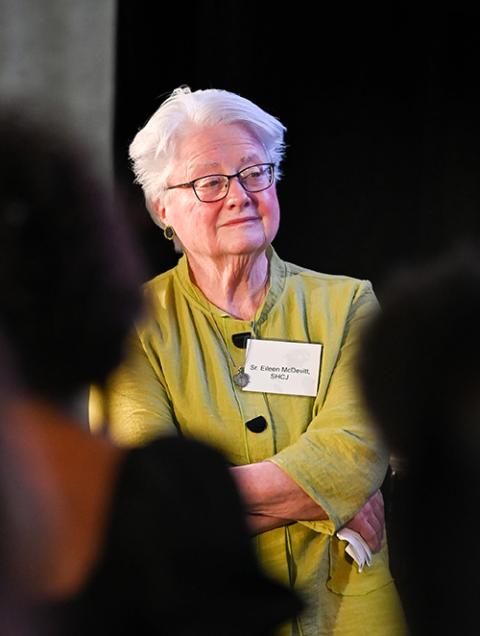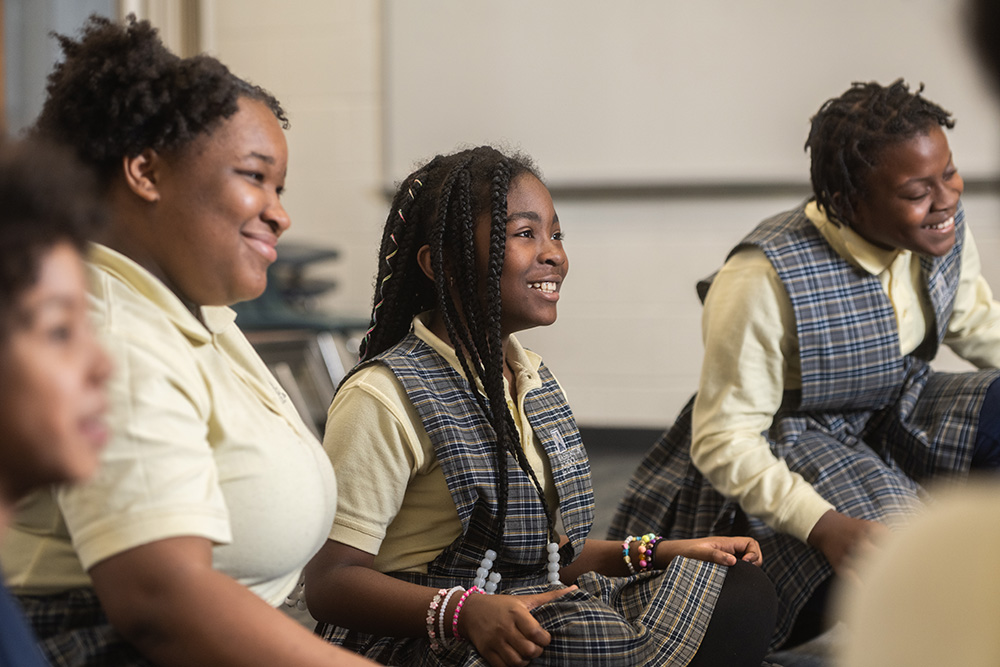
Students attend class at Washington School for Girls in southeast Washington, D.C. Hailed for its rigorous curriculum, the school was co-founded by members of the Religious of Jesus and Mary, the Society of the Holy Child Jesus, and the National Council of Negro Women. (Courtesy of Washington School for Girls)
Three decades ago, Sr. Mary Bourdon couldn't ignore a troubling problem. Living in Washington, D.C., the member of the Religious of Jesus and Mary observed patterns in certain areas with school dropouts, teen pregnancies and low academic scores.
"I looked out at my world and thought, 'There's a great injustice here. A quality education is not being delivered across the board,' " said Bourdon, 74, who previously worked as a teacher and director of the Religious of Jesus and Mary's volunteer program.
She had reason for concern, as Washington has long grappled with a dearth of equitable education. According to a 2023 assessment by Washington's Office of the State Superintendent of Education, 23% of Black students and 32% of Latinx students in Washington showed proficiency in reading, compared to 82% of white students.
Bourdon found others eager to champion the cause. In 1995, she conducted numerous discussions with members of the Society of the Holy Child Jesus and the National Council of Negro Women about tackling this community issue.
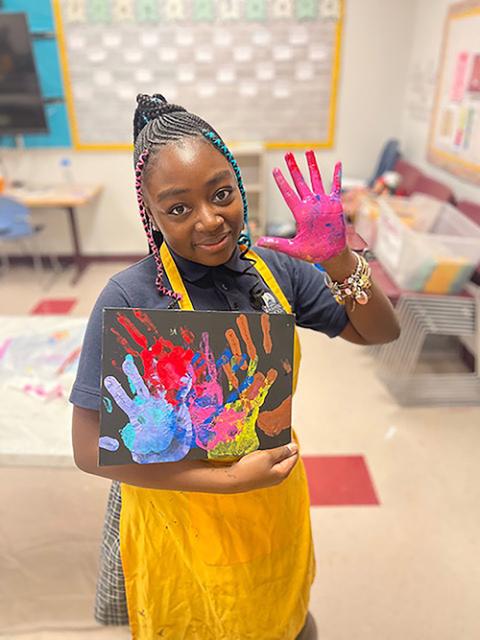
A student at Washington School for Girls holds an art project. (Courtesy of Washington School for Girls)
"We all just clicked, because we all had the same vision," said Holy Child Jesus Sr. Eileen McDevitt, 77, director of the Holy Child Network of Schools. "Students [in underserved areas] deserve the same quality education in a safe, caring, trusting environment that girls have in private schools."
The group emulated the founders of their three organizations, Bourdon added, all educators and advocates for teaching girls.
"Finally we said, 'The single most important thing we can do to make a difference is open a school,' " she said.
This sparked their co-founding the Washington School for Girls, an independent, all-girls Catholic school in the marginalized area of southeast Washington. Now in its 27th year, Washington School for Girls teaches third through eighth grades with a rigorous curriculum and comprehensive enrichment programs.
With a student body that is entirely girls of color, the school helps provide equal access to high-quality education, with donor-funded scholarships paying 100% of tuition for every student. The majority of Washington School for Girls' 300 alumnae have gone on to graduate high school and college.
"I like to say [the school] is leveling the playing field," Bourdon said. "There are many girls who are very intelligent and very powerful who deserve this."
Balancing many roles
Washington School for Girls launched in the basement of an apartment building in 1997, thanks to the sisters' connections with local developers. Beginning as an afterschool program, the school evolved to teach multiple grades.
The co-founders maximized community support, Bourdon said. A school across the street provided Washington School for Girls' first set of furniture, and allowed the students to use its basketball court. The staff walked students to the library every day, and used a neighboring church to serve meals.
"People say we had a basement, but we really had a campus," Bourdon said.
Advertisement
She initially juggled many roles, including school principal, accountant and coach.
"I had a whistle in my mouth for basketball, and a pen in my hand for accounting," joked Bourdon.
Sr. Janet Stolba, 84, a member of the Religious of Jesus and Mary, also shouldered various duties, including tutoring students, mentoring new teachers and volunteering as a teacher's aide.
Now a Washington School for Girls board member, Stolba considered her efforts crucial to improving education in the historically underserved areas of Ward 7, which is 83% Black with 23.8% living below the poverty line; and Ward 8, which is 82% Black and 27.7% of residents below the poverty line.
"Girls in Ward 8 were in danger of terminating their education, unless there was a school where they could flourish," said Stolba, who had previously served as regional supervisor for all Catholic elementary schools in Washington.
A board member throughout Washington School for Girls' existence, McDevitt worked with the board to build a robust faculty, find new locations as the school grew, and raise millions of dollars to keep the school operating year after year.
The board "is always looking to find a better situation for the girls," said McDevitt, who had previously helped open a school in New York. "It's about getting the best teachers, and being able to pay them."
The school now shares a building at D.C.'s innovative Town Hall Education Arts Recreation Campus (THEARC), a 16-acre campus housing 14 nonprofits. Offering cutting-edge infrastructure such as a community theater, regulation-size gymnasium, computer labs, playgrounds, libraries and more, THEARC dramatically expands the resources available to Washington School for Girls students.
"They have access to all those amenities," Bourdon said. "It's hard to believe it all started in a basement."
Shaping the whole child
The co-founders always maintained their vision of an all-girls school with individualized, experiential-based teaching methods to help students thrive as leaders.
"An all-girls school is instrumental in grounding them in being proud of who they are and finding their own strength," Bourdon said. "We have a motto, 'Never do something the students can do. Don't do it for them, let them take the lead.' "
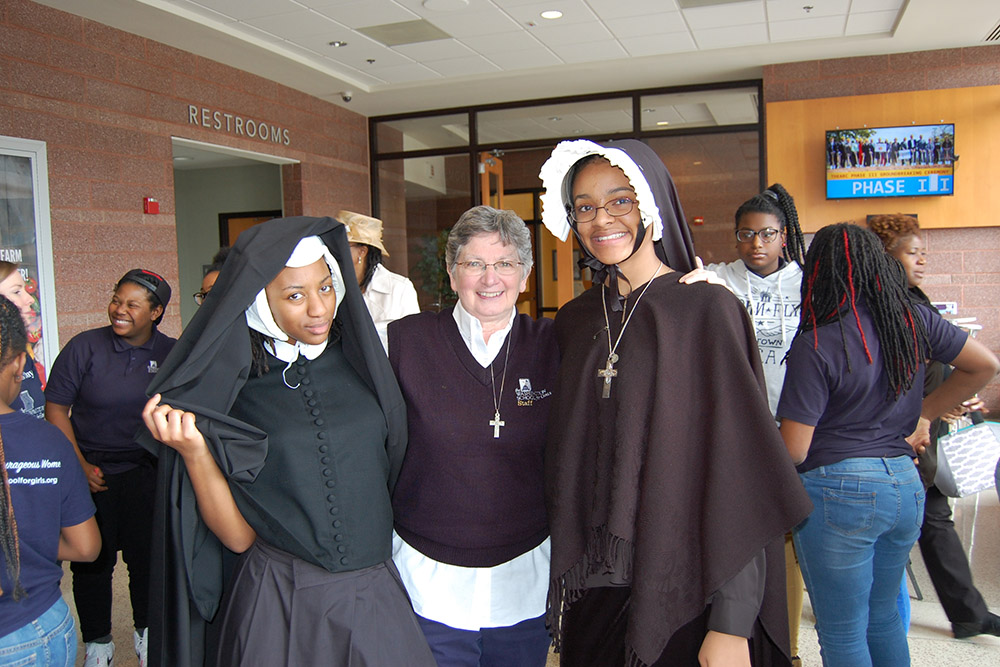
Sr. Mary Bourdon (center), a member of the Religious of Jesus and Mary, co-founded the Washington School for Girls, which helps provide equal access to high-quality education in Washington, D.C. (Courtesy of Washington School for Girls)
In this spirit, the co-founders developed a challenging curriculum, including an extended school day with a mandatory afterschool period. This allowed students to participate in enrichment activities like Junior Achievement, cooking classes, economic clubs and more.
The enrichment activities "complemented and brought an experiential level to what they were learning in school," Bourdon said.
Washington School for Girls also established programs directly involving families, she added, including an initiative promoting mother-daughter outings.
"[Students'] first teachers are the parents," she said. "We try to involve them in education."
The school has always offered experiences to nurture students' confidence and leadership skills, Stolba added.
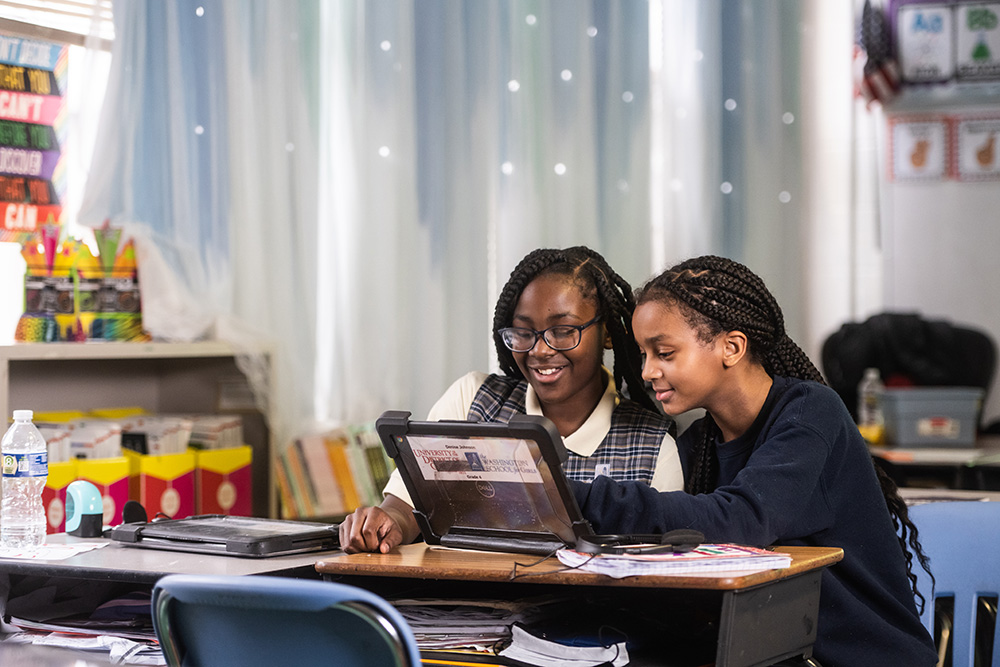
Students work together at Washington School for Girls in southeast Washington, D.C. (Courtesy of Washington School for Girls)
"The girls are often given opportunities to speak in front of their peers and other audiences," she said. "They are given opportunities to be responsible for younger students and events and projects."
These efforts branched into Washington School of Girls further prepping students for the demanding entrance requirements of private and charter high schools, Stolba said.
The school rounds out its curriculum with faith-based education, McDevitt noted.
"When we talk about shaping the whole child, we're developing them spiritually, emotionally, physically, intellectually," she said. "That's the hallmark of the school."
The effect of all of this is evident in the students' accomplishments, Stolba said.
"A majority of the [graduates] have a bachelor's degree from college," she said. "Some have graduate degrees, law degrees and other prestigious positions in various institutions."
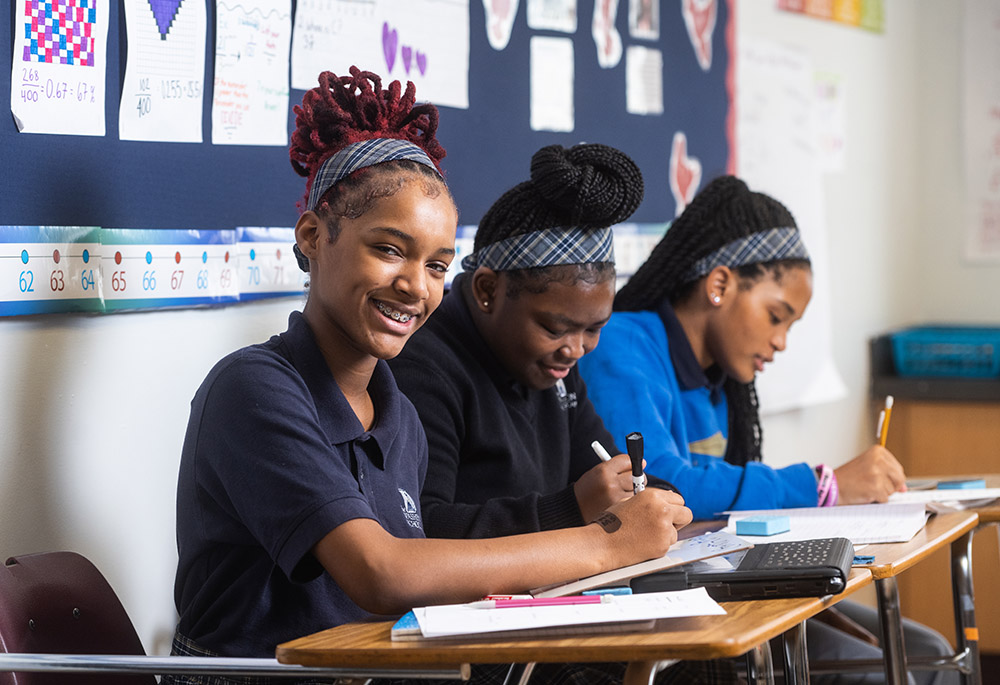
Students work on assignments at Washington School for Girls. "We lean into developing these girls, so they come away feeling they can be whatever they choose to be," says school president Beth Reaves. (Courtesy of Washington School for Girls)
Continuing to evolve
With the co-founding sisters still closely involved, Washington School for Girls' efforts continue to expand.
The school collaborates with many nonprofits on THEARC's campus, such as Levine Music, the Boys & Girls Club, Washington School of Ballet and an urban farm.
Students can participate at no cost in activities and classes with these partners during Washington School for Girls' afterschool period, said school president Beth Reaves.
"A big part of educational equity is having access to opportunities," Reaves said. "We are able to bring those things forward to our students in a way that allows them to participate in things that maybe they wouldn't have otherwise."
The school maintains the co-founders' commitment to academic excellence, she said, lauding Washington School for Girls' year-round school schedule and a faculty with 70% of teachers possessing or earning a master's degree.
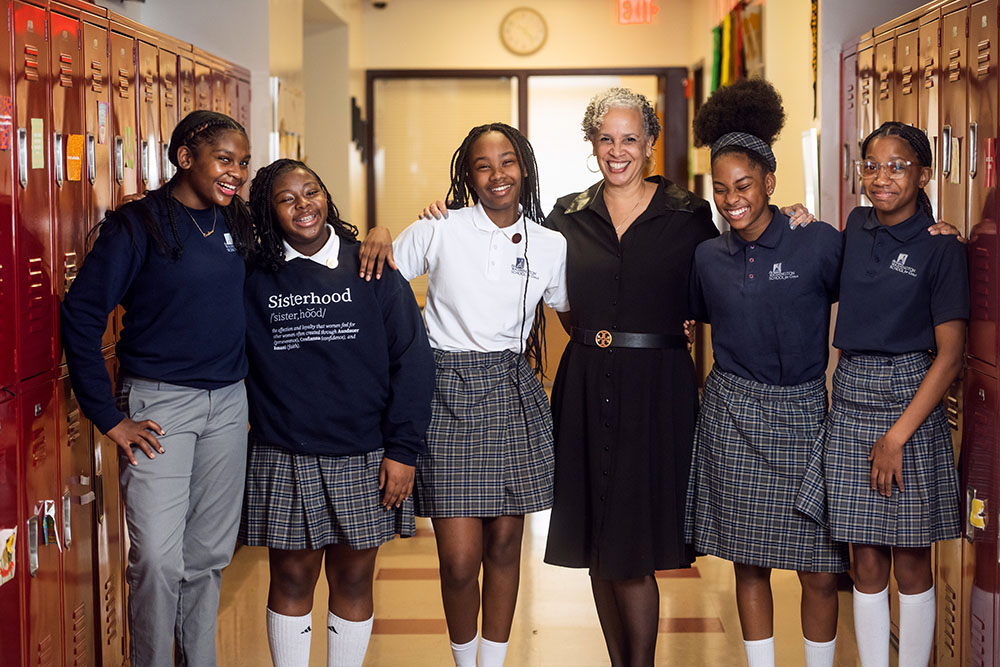
Dr. Beth Reaves (third from right), president of Washington School for Girls, stands alongside several students. (Courtesy of Washington School for Girls)
Washington School for Girls also assists its alumnae with tutoring and even financial support throughout their high school and college years, Reaves said.
"We lean into developing these girls, so they come away feeling they can be whatever they choose to be," she said.
She recalled one alumna, Yolanda Long, who became the first in her family to attend college and further graduated from law school. Now a project attorney at the National Juvenile Defender Center, Long recently became a board member.
"That cycle of success comes from adults believing in you when you're young, and helping you to become who you're intended to be," Reaves said. "I just love that we're still continuing to realize the mission the early founders set forward for us."
Stolba, McDevitt and the rest of the board recently completed "the biggest fundraising [project] we've ever had," McDevitt added, to fund this year's groundbreaking on a new building entirely for the school.
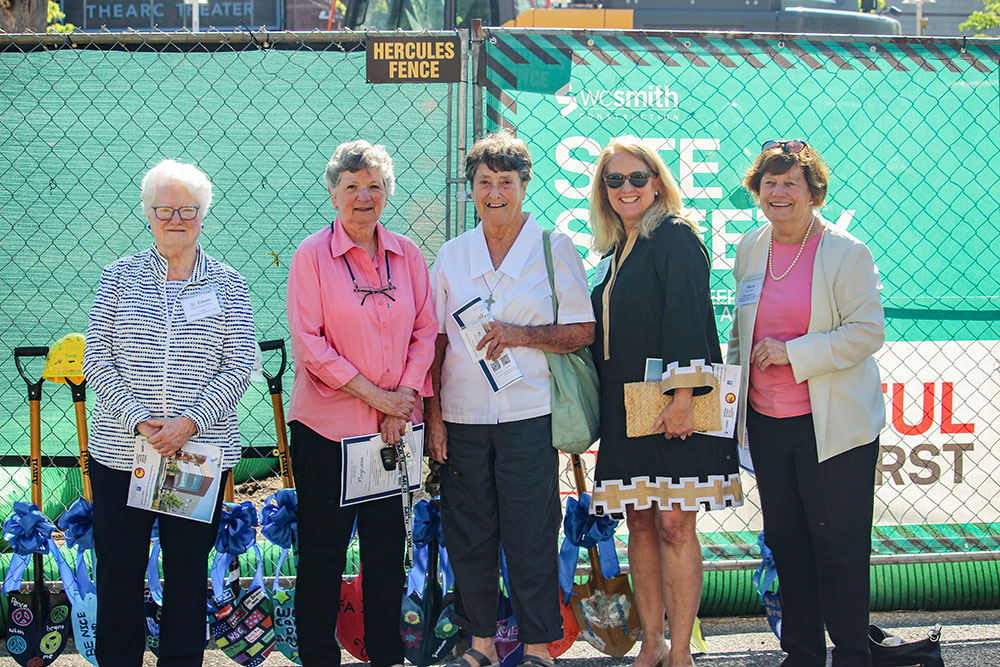
At the groundbreaking this year of a new building for the Washington School for Girls are (from left): Sr. Eileen McDevitt of the Society of the Holy Child Jesus; Sr. Mary Bourdon of the Religious of Jesus and Mary; Sr. Janet Stolba of the Religious of Jesus and Mary; Bridget Morris, chair of the Washington School for Girls Board of Trustees; and C. Maury Devine, chair of the Building Dreams Capital Campaign. (Courtesy of Washington School for Girls)
With the school's younger grades currently housed on a separate campus 5 miles away, the new building will consolidate all grades on THEARC campus, providing a top-quality school previously only seen in higher-income areas.
"From the girls' perspective, this is something that is theirs," McDevitt said. "The pride they have in this is amazing."
Paying it forward
Washington School for Girls alumna Joey Adams still hails her experiences there that "contributed to the individual I am today."
This includes learning how to budget, from a yearlong assignment of mapping out expenses on a pretend salary.
"That project in its entirety left a mark on me," said Adams, 28, who now works at Washington School for Girls as manager of graduate support. "It assists with a lot of life decisions to this day."
She enjoyed daily dance classes through the school's partnership with Washington School of Ballet, she added.
Washington School for Girls; curriculum "honestly overprepared" Adams for her charter high school, she said, helping her earn a full scholarship at Sewanee the University of the South in Tennessee.
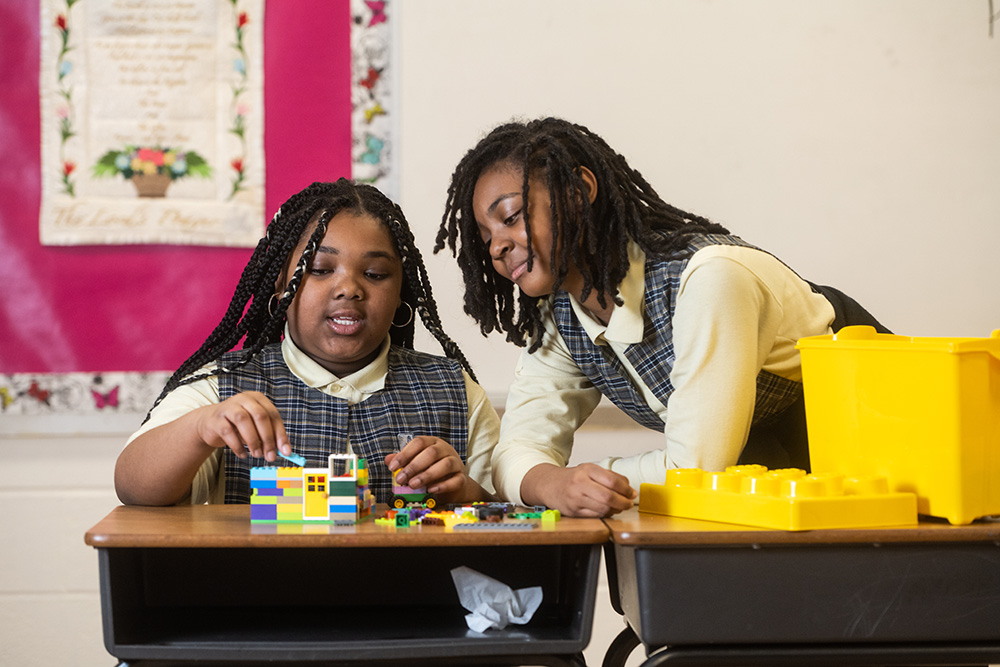
Students build together at Washington School for Girls, which offers a wide array of enrichment activities. (Courtesy of Washington School for Girls)
She most cherished the relationships she forged with fellow students and teachers, which she maintained throughout high school and college.
Washington School for Girls "really didn't feel like school," she said. "It felt more like a family."
In her current role, she visits Washington School for Girls alumnae at their high schools and responds to their requests for aid, even recently helping a graduate's family with financial difficulties.
She provides every graduate with her personal phone number, she added.
"We want our girls and families to know that in whatever capacity you may need, please know we are here," she said.
Bourdon believes the impact of Washington School for Girls extends far beyond the school.
"Giving proper education to the next generation is better in every single way for our world," she said.

